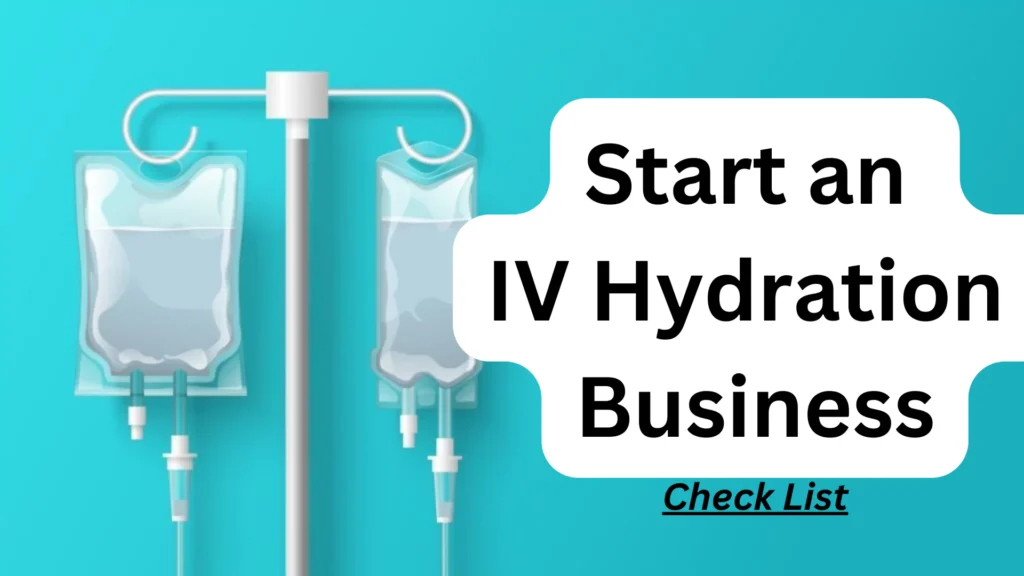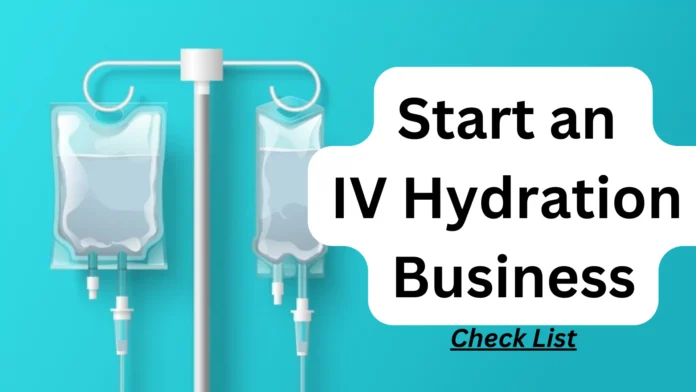Introduction
IV hydration therapy is a medical treatment that involves the administration of fluids, vitamins, and minerals directly into the bloodstream through an intravenous (IV) catheter. This treatment is becoming increasingly popular, especially among athletes, busy professionals, and individuals seeking relief from hangovers, jet lag, and other conditions. As a result, the IV hydration business has become a lucrative industry, with many entrepreneurs looking to start their own businesses in this field.

Starting an IV hydration business can be a great opportunity for entrepreneurs who are passionate about health and wellness. This industry offers a unique blend of medical and business expertise, and it can be a rewarding experience to help people improve their health and well-being. In this article, we will explore the key steps involved in starting an IV hydration business, from understanding the business model to obtaining the necessary licenses and permits.
What Do You Need To Start An IV Hydration Business
Starting an IV hydration business requires a significant capital investment, as well as a solid business plan and legal structure. You will also need to obtain insurance coverage to protect your business from liability. Here are some of the key requirements for starting an IV hydration business:
Capital investment: Starting an IV hydration business can cost anywhere from $50,000 to $150,000, depending on the size and scope of your business. This includes the cost of equipment, supplies, rent, and staffing.
Business plan: A business plan is essential for any new business, as it outlines your goals, strategies, and financial projections. Your business plan should include a market analysis, a marketing plan, and a financial plan.
Legal structure: You will need to choose a legal structure for your business, such as a sole proprietorship, partnership, LLC, or corporation. This will determine your tax obligations and liability.
Insurance coverage: You will need to obtain liability insurance to protect your business from lawsuits and other claims. You may also need workers’ compensation insurance if you have employees.
Understanding the IV Hydration Business Model
To start an IV hydration business, it is important to understand the different types of IV hydration services, revenue streams, and profit margins. Here are some key factors to consider:
Types of IV hydration services: There are several types of IV hydration services, including hydration therapy, vitamin therapy, and detox therapy. Each type of therapy requires different types of fluids and supplements.
Revenue streams: IV hydration businesses generate revenue through the sale of IV therapy sessions, as well as the sale of supplements and other products. Some businesses also offer mobile services, which can generate additional revenue.
Profit margins: Profit margins for IV hydration businesses can vary widely, depending on factors such as location, pricing, and overhead costs. However, many businesses report profit margins of 30-50%.
Starting an IV Hydration Business
Once you have a solid understanding of the IV hydration business model, it is time to start your own business. Here are some key steps to follow:
Choosing a location: Location is critical for any business, and IV hydration businesses are no exception. Look for a location that is easily accessible, visible, and has high foot traffic.
Setting up the physical space: Your physical space should be clean, comfortable, and welcoming. You will need to purchase equipment such as IV pumps, catheters, and tubing, as well as furniture and decor.
Creating a brand identity: Your brand identity should reflect your business values and mission. This includes your logo, website, marketing materials, and social media presence.
Identifying Your Target Market and Competition
To succeed in the IV hydration business, it is important to identify your target market and understand your competition. Here are some key factors to consider:
Demographics of potential customers: Your target market may include athletes, busy professionals, travelers, and individuals seeking relief from hangovers, jet lag, and other conditions.
Competitor analysis: Research your competitors to understand their pricing, services, and marketing strategies. This will help you differentiate your business and identify areas for improvement.
Differentiating your business from competitors: To stand out from your competitors, you may need to offer unique services, pricing, or marketing strategies. Consider offering mobile services, partnering with local businesses, or offering package deals.
Obtaining the Necessary Licenses and Permits
Starting an IV hydration business requires compliance with state and local regulations, as well as health department requirements. Here are some key factors to consider:
State and local regulations: Each state and local jurisdiction has its own regulations for IV hydration businesses. Research these regulations to ensure compliance.
Health department requirements: You will need to obtain a health department permit to operate an IV hydration business. This may require inspections and compliance with specific health and safety standards.
Business licenses and permits: You will need to obtain a business license and other permits, such as a sales tax permit and zoning permit.
Sourcing Quality IV Hydration Supplies and Equipment
To provide high-quality IV hydration services, you will need to source quality supplies and equipment. Here are some key factors to consider:
Types of IV fluids and supplements: There are many types of IV fluids and supplements available, each with its own benefits and risks. Research these options to determine which ones are best for your business.
IV catheters and tubing: IV catheters and tubing come in different sizes and materials. Choose high-quality products that are comfortable for your clients and easy to use.
IV pumps and other equipment: IV pumps and other equipment should be reliable, easy to use, and easy to maintain. Consider purchasing equipment from reputable suppliers with good customer service.
Hiring Qualified Staff and Training Them Properly
To provide high-quality IV hydration services, you will need to hire qualified staff and train them properly. Here are some key factors to consider:
Job roles and responsibilities: Your staff may include nurses, medical assistants, and administrative staff. Clearly define their roles and responsibilities to ensure smooth operations.
Qualifications and certifications: Your staff should have the necessary qualifications and certifications to provide IV hydration services. This may include nursing licenses, CPR certifications, and IV therapy certifications.
Training programs: Provide ongoing training and education for your staff to ensure they are up-to-date on the latest IV hydration techniques and best practices.
Establishing a Strong Online Presence and Marketing Strategy
To attract customers and grow your business, you will need to establish a strong online presence and marketing strategy. Here are some key factors to consider:
Website development: Your website should be professional, easy to navigate, and optimized for search engines. Include information about your services, pricing, and location. Always choose professional website developers to make your online presence appealing.
Social media marketing: Use social media platforms such as Facebook, Instagram, and Twitter to promote your business and engage with potential customers.
Email marketing: Build an email list of customers and potential customers to send newsletters, promotions, and other updates.
Advertising and promotions: Consider advertising in local publications, partnering with local businesses, and offering promotions and discounts to attract new customers.
Ensuring Compliance with Health and Safety Regulations
To protect your clients and your business, it is important to ensure compliance with health and safety regulations. Here are some key factors to consider:
Infection control measures: Follow strict infection control measures, such as hand hygiene, use of personal protective equipment, and proper cleaning and disinfection of equipment.
Proper disposal of medical waste: Follow proper procedures for the disposal of medical waste, such as sharps and biohazardous materials.
OSHA regulations: Follow OSHA regulations for workplace safety, such as proper labeling of hazardous materials and use of safety equipment.
Conclusion
Starting an IV hydration business can be a rewarding experience for entrepreneurs who are passionate about health and wellness. By following these key steps, you can start a successful business that provides high-quality IV hydration services to your clients. Remember to stay up-to-date on the latest trends and best practices in the industry, and always prioritize the health and safety of your clients.


